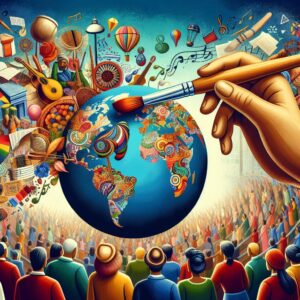By Sharon Schweitzer
Universal Day of Culture is the product of an international pact to ratify a legal recognition of the conservation of cultural objects and works of art. Known as the Treaty on the Protection of Artistic and Scientific Institutions and Historic Monuments, or the Roerich Pact, it legally grants precedence to preserving artworks over military necessity in case of armed conflict. The document was drafted by the eponymous Nicholas Roerich, a Russian painter and author, in an effort to protect cultural and scientific works against destruction in armed conflict. Several nations recognize this significant day by organizing initiatives and events. Also referred to as the World Day of Culture, this is one of many holidays that commemorate an international cause, bringing people together under one goal.
The Roerich Pact was first proposed in 1931, explaining the significance of the Universal Day of Culture. On April 15, 1935, it was first ratified by the United States in Washington, marking April 15th as the official day for the international observance. Throughout the 20th century, several efforts were made to enable the aim of this holiday, making it one of the most significant international celebrations. The Banner of Peace, which still accompanies every observance of this special day across the world, is recognized as the symbol of the pact.
An international movement supports the affirmation of this universal day and all participating countries organize and coordinate international programs to enable intercultural dialogue, one of the goals of the day. Charity organizations in Cuba, Italy, Lithuania, Latvia, Russia, and Spain came together to form The International Movement for the affirmation of April 15 as Universal Day of Culture (I.M.A.U.D.C.) in December 2008. Forty organizations from 14 countries, and 25,000 individuals, currently participate in the Movement.
Cultural diversity is one of the leading causes of conflict in society. Whether that occurs within one country or across multiple, the results that follow can be catastrophic.
However, cultural diversity is an important part of life. It allows us to connect with individuals and see things from a whole new perspective. This has the power to be transformative and beneficial to everyone around the world.
One of the best ways to celebrate Cultural Diversity Day is to connect with cultures that are different from yours. In some cities, educational seminars, concerts, or demonstrations are held to recognize and celebrate this day.
Photo by medium.com
Sharon Schweitzer JD, is a diversity and inclusion consultant, cross-cultural trainer, etiquette expert, and the founder of Access to Culture. In addition to her accreditation in intercultural management from the HOFSTEDE Centre, she is an attorney and mediator. Sharon served as a Chinese Ceremonial Dining Etiquette Specialist in the documentary series Confucius was a Foodie, on Nat Geo People. Her Amazon #1 Best Selling book in International Business, Access to Asia: Your Multicultural Business Guide, won a coveted Kirkus Star, and was named to Kirkus Reviews’ Best Books. She’s a winner of numerous awards, including the British Airways International Trade Award at the Greater Austin Business Awards.
#SharonSchweitzer, #AccesstoCulture, Access2Culture, #InternationalCelebration, #AccesstoAsia, #GlobalEtiquette, #Cross-CulturalTrainer, #InterculturalCommunication, #InternationalCommunication, #Interculturalist, #Etiquette, #CultureExpert, #Speaker, #KeynoteSpeaker, #UniversalDayofCulture, #Italy, #Spain, #UnitedStates, #Diversity


Leave A Comment